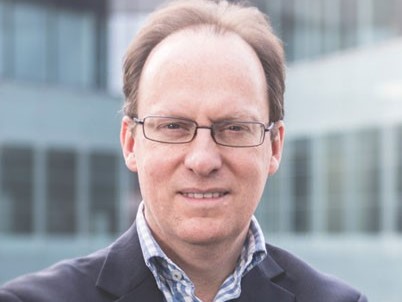With ten successful start-ups to his name, CIMR Visiting Fellow Stephen Sykes is well-equipped to support entrepreneurial students in their business ventures. He reflects on his past successes and shares what it’s like to work alongside Birkbeck’s budding entrepreneurs.
Your academic background is in Law – why did you decide to start your own business?
I was a bit of a non-comformist when it came to law: I grew up on free school meals in a single parent household and didn’t even know what a university was until I was fifteen. Being plunged into the world of law and partnership after my Masters degree left me itching to do something fresh.
Specialising in environmental law led me to my first start-up: a business that would insure environmental risks. Questions around environmental law were particularly pertinent at the time and it was an opportunity for us to offer a market-leading solution in a period of uncertainty. The business really took off – after eighteen months, it was valued at about $200 million.
From that venture I took away two key learnings: firstly, that it’s crucial to listen to decision-makers and potential customers to learn how to modify ideas, and secondly that if you’ve got a good idea, you should hold onto the equity! I ended up owning just one per cent equity in my first start-up, but in my second, four or five of us owned the lot. It’s these kind of first-hand experiences that I’m able to share with students.
From that point on, I’ve been involved in a number of start-ups in insurance and the environmental sector. I’ve now also branched out with my latest venture, Tree Tents, which is a tangible product as opposed to services. Suddenly I had to consider supply chains, office space, storage and all the things that can go wrong with them. By 2018, we had secured the National Trust as a client, were selling to America and counting Bear Grylls as a client as well!
You bring a wealth of real-world experience to the classroom. How does this fit into your work with students?
As an entrepreneur, I find it fascinating to see people’s ideas for businesses, from modest plans like a restaurant all the way through to blockchain technology.
I’ve been a Visiting Fellow at the CIMR for five years and the interaction with each cohort of students, Professor Helen Lawton Smith and Dr Muthu De Silva works really well. I’m able to share the good, the bad and the ugly of starting a business and to help students learn from my experience. As a hands-on entrepreneur, I can also learn from Muthu: understanding the academic underpinnings of how businesses operate makes me a better entrepreneur. It’s reinforcing and enjoyable for me and hopefully for the students.
What’s great about the MSc Business Innovation course is that students developing business plans aren’t doing it for the module grade: they really want their business to be a success. In the mentoring process, the most precious thing of all is a good idea. I want to be involved as soon as that candle gets lit, put a shield around it, protect it and see if it can grow. I provide one-to-one tutorials to help students get the most out of the course, reframing the blocks of academic knowledge they’ve acquired into questions that will help them develop their ideas.
What’s it been like working with Alexander Flint Mitchell on Blind Cupid?
My initial involvement in Blind Cupid was through marking Alexander’s business plan. I always tell students that they’re free to contact me with any questions they have, and Alexander would drop me a line every now and again to ask my opinion on his business.
I don’t get involved in many start-ups nowadays because they’re hard work! But a dating app, offering that kind of service was completely novel to me as a business, so when Alexander asked to meet and talk it through, I was keen to get involved.
We’ve been able to work on all the legal and risk aspects of the business ourselves. The artificial intelligence element of the app is really exciting and has potential beyond matching people: it’s supporting a kind of self-discovery that can really enrich people’s lives.
Alexander is incredibly well-organized, energetic and driven. It’s exciting to be involved in making something happen. As an entrepreneur, it’s interesting to look into how we shaped it, the contribution I’ve made, but also how Alexander has grown throughout the process.
The number of people that set off on that journey and the number that pull it off are few and far between. You’ve got to be resilient. The key ingredients to see ideas through are self-belief and confidence. It took confidence for Alexander to ask for my help and that tells me something about him.
My assumption is always ‘we can make this work.’ It’s just a question of how we can go about it. I’d never say anything that takes away the energy from an entrepreneur, because they’re brave people. Every one of our students has the potential to do something pretty remarkable and we’re helping them on that journey.
Further Information
· MSc Business Innovation with Entrepreneurship

